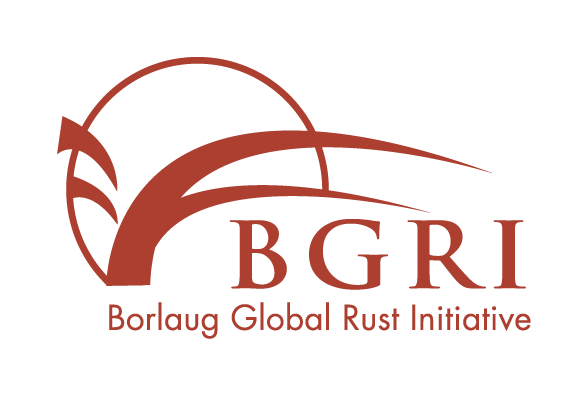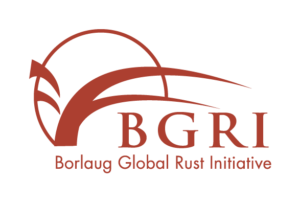Gene Stewardship Award
Award Summary
The BGRI Gene Stewardship Award, established in 2012, is presented annually at the BGRI Technical Workshop to recognize a researcher or team of researchers serving a national breeding program or other nationally based institution.
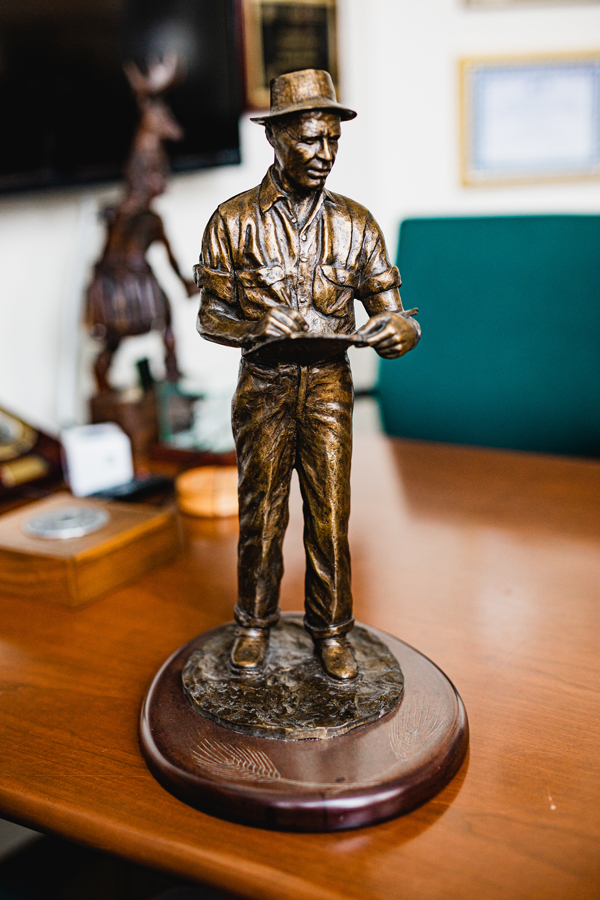
Eligibility
Any wheat researcher or research team working on wheat rust.
Nominees will be judged on:
Excellence in the development, multiplication and/or release of rust resistant wheat varieties through appropriate means that encourage diversity and complexity of resistance
Promotion of the durability of the materials
Implementation of the BGRI’s goal of responsible gene deployment and stewardship.
Nomination Process
To apply, please supply nomination letter and two supporting letters. Each letter should be no longer than two pages and should provide an explanation of how the nominee(s) has furthered the BGRI’s ethos of responsible gene stewardship through responsible gene deployment and variety release.
A complete nomination package includes:
- Nomination letter (self-nominations are acceptable)
- Two supporting letters
- Information on the nominator and the nominee(s)
The nomination period is currently closed. Please check back for updates on the next award announcement.
Gene Stewardship Winners
2021

Agriculture and Agri-Food Canada
“With a core team of wheat breeders, pathologists, cytogeneticists and molecular biologists, the AAFC team has maintained an enduring commitment protecting wheat in Canada and around the globe,” said Ronnie Coffman, vice-chair of the BGRI and professor in Cornell’s Department of Global Development. “They are collaborators who work across disciplines and borders to provide support and germplasm to develop rust-resistant cultivars.”
The team includes:
- Tom Fetch, Stem Rust Pathologist
- Brent McCallum, Leaf Rust Pathologist
- Reem Aboukhaddour, Stripe Rust Pathologist
- Ron Knox, Molecular Pathologist
- Samia Berraies, Molecular Pathologist
- Santosh Kumar, Wheat Breeder
- Gavin Humphreys, Wheat Breeder
- Andrew Burt, Wheat Breeder
- Richard Cuthbert, Wheat Breeder
- Yuefeng Ruan, Wheat Breeder
- Robert Graf, Wheat Breeder
- Harpinder Randhawa, Wheat Breeder
- Colin Hiebert, Cytogeneticist
- R. Kerber, Cytogeneticist
- George Fedak, Cytogeneticist
- L. Dyck, Geneticist
- Sylvie Cloutier, Molecular Biologist
- André Laroche, Molecular Biologist
- Curt McCartney, Molecular Biologist
2020
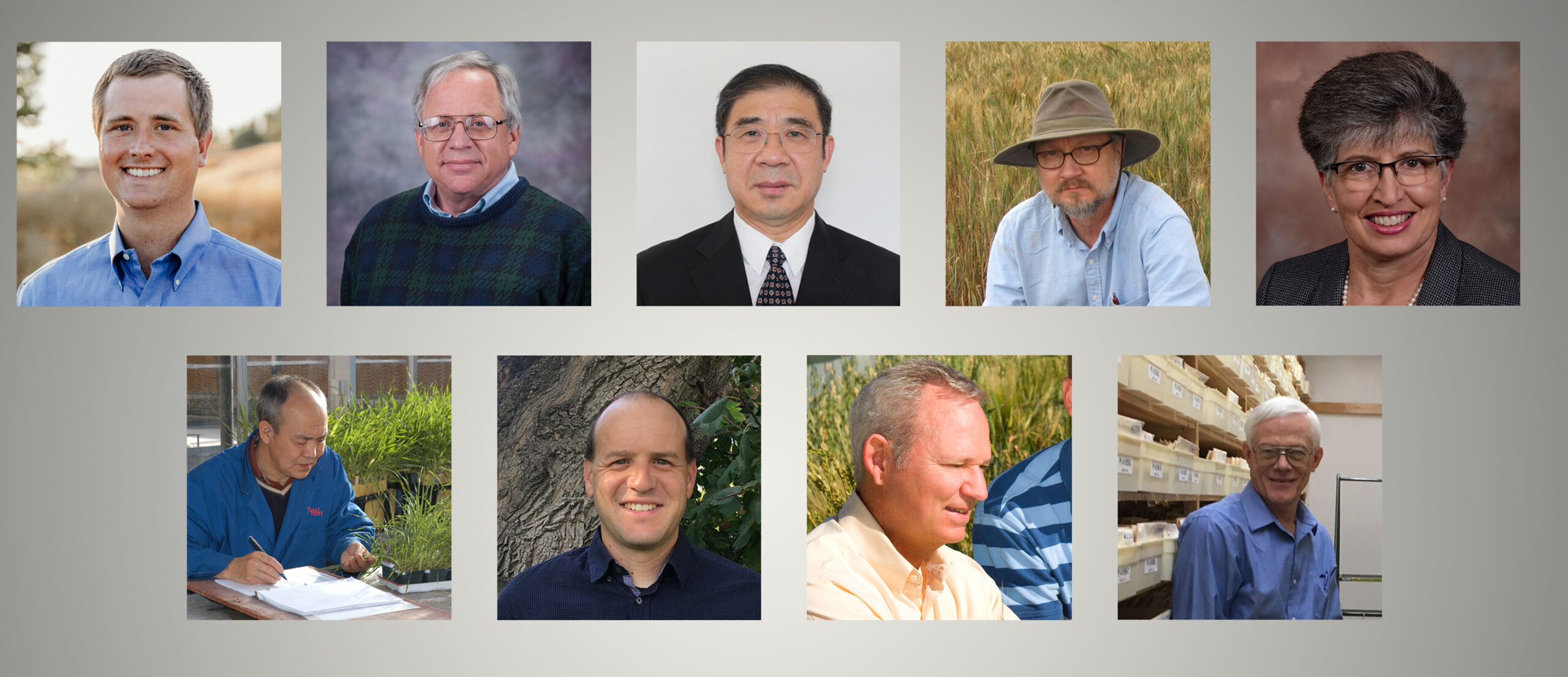
USDA-ARS
The USDA team — with scientists based across a network of labs in Idaho, Kansas, Minnesota, North Carolina and North Dakota — has displayed international leadership in identification of resistance sources, mapping, marker development, and pyramiding of resistance genes, and other efforts to develop breeder-friendly germplasm.
“Combatting Ug99 and the other cereal rusts is definitely a team effort,” said Robert Bowden, supervisory research plant pathologist at USDA-ARS Hard Winter Wheat Genetics Research. “We’re proud at the USDA to be part of the amazing and inspiring global effort to deploy durable resistance to protect our crops and communities from these ancient enemies.”
The team, pictured above, l-r
- Matthew Rouse, research plant pathologist at USDA-ARS Cereal Disease Laboratory
- Robert Bowden, supervisory research plant pathologist at USDA-ARS Hard Winter Wheat Genetics Research
- Steven Xu, research geneticist at USDA-ARS Cereal Crops Research
- David Marshall, research leader at USDA-ARS Plant Science Research
- Mary Guttieri, research geneticist at USDA-ARS Hard Winter Wheat Genetics Research
- Yue Jin, research plant pathologist at USDA-ARS Cereal Disease Laboratory
- Tyler Gordon, plant pathologist at USDA-ARS Small Grains and Potato Germplasm Research
- Mike Bonman, supervisory research plant pathologist at USDA-ARS Small Grains and Potato Germplasm Research
- Harold E. Bockelman, supervisory agronomist at USDA-ARS Small Grains and Potato Germplasm Research
2018
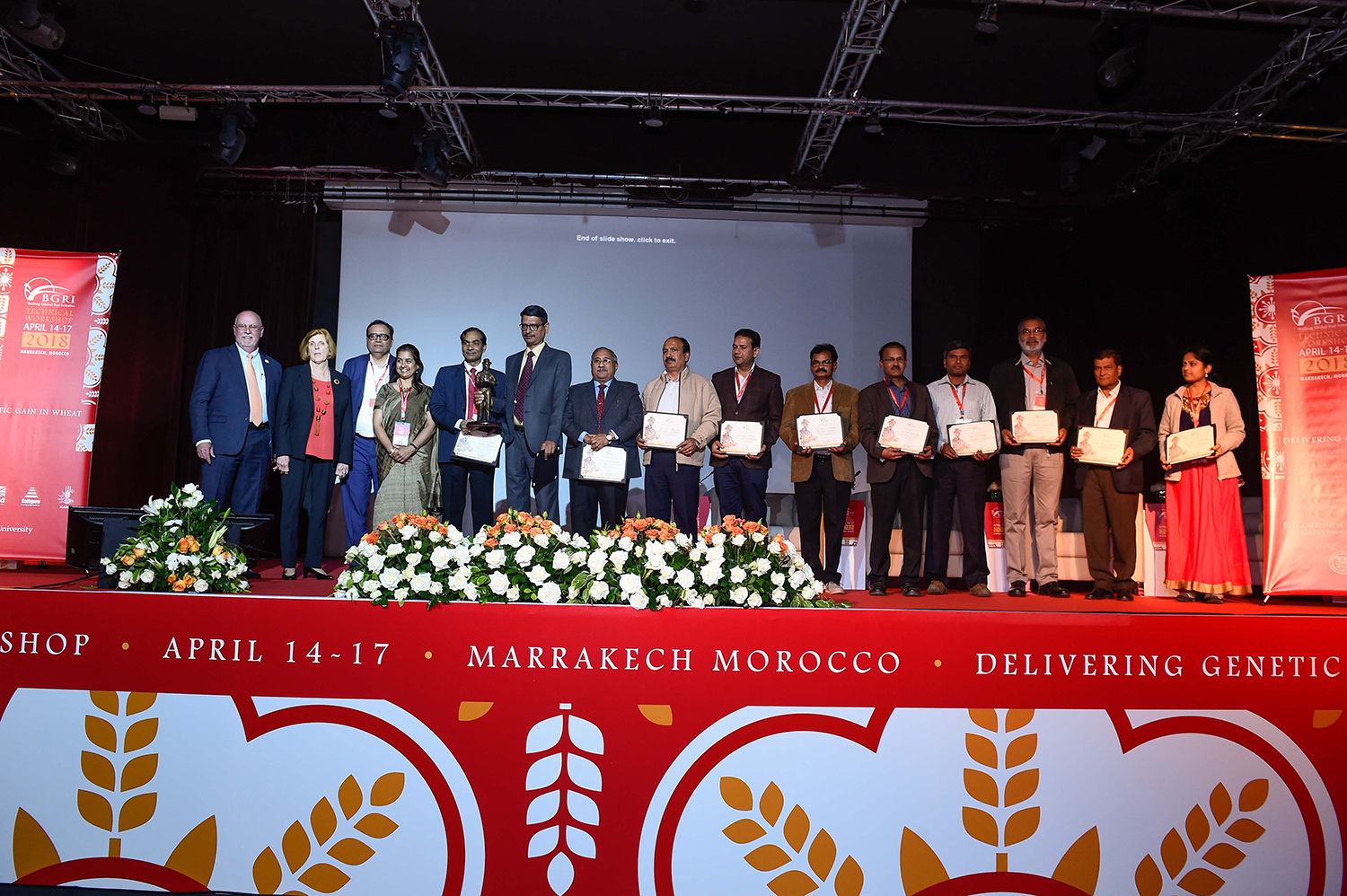
India
The Indian Council of Agricultural Research (ICAR), New Delhi, India, and associated institutions received the 2018 BGRI Gene Stewardship Award in recognition of outstanding contributions in wheat research and development, including: strong investment in and impact on wheat rust control through development, constant release, and dissemination of agronomically-superior rust resistant wheat varieties; contributions to significantly increase wheat productivity on around 30 million hectares; avoidance of rust epidemics in recent years by replacing susceptible wheat varieties with resistant varieties; establishment of the Regional Wheat Disease Monitoring Nursery and its important role in survey, surveillance, and identification of new pathotypes; the characterization of rust resistance genes, their introgression, and management; use of selection strategies for durable rust resistance based on minor genes; the utilization of farmer participatory variety selection; and excellent international collaboration.
Among the individuals in attendance in Marrakech in 2018 to receive the award were: Dr. Trilochan Mohapatra, Dr. Gyanendra Pratap Singh, Dr. Ravish Chatrath, Dr. S.C. Bhardwaj, Dr. M. Sivasamy, Dr. Virinder Singh Sohu, Dr. Sai V. Prasad, Dr. Satish Kumar, Dr. V.K. Vikas, Dr. Parveen Chhuneja, Dr. R.R. Hanchinal, and Dr. Suma S Biradar. Others named who were not able to attend were: Dr. Indu Sharma, Dr. K.V. Prabhu, Dr. A.N. Mishra, Dr. M.S. Saharan, Dr. C.N. Mishra, Dr. Navtej Bains, Dr. Kuldeep Singh and Dr. G. Mavi.
Dr. Trilochan Mohapatra, the director general of ICAR, and Ambassador Dr. Kheya Bhattacharya, received the award with a number of awardees present at the meeting.
2015
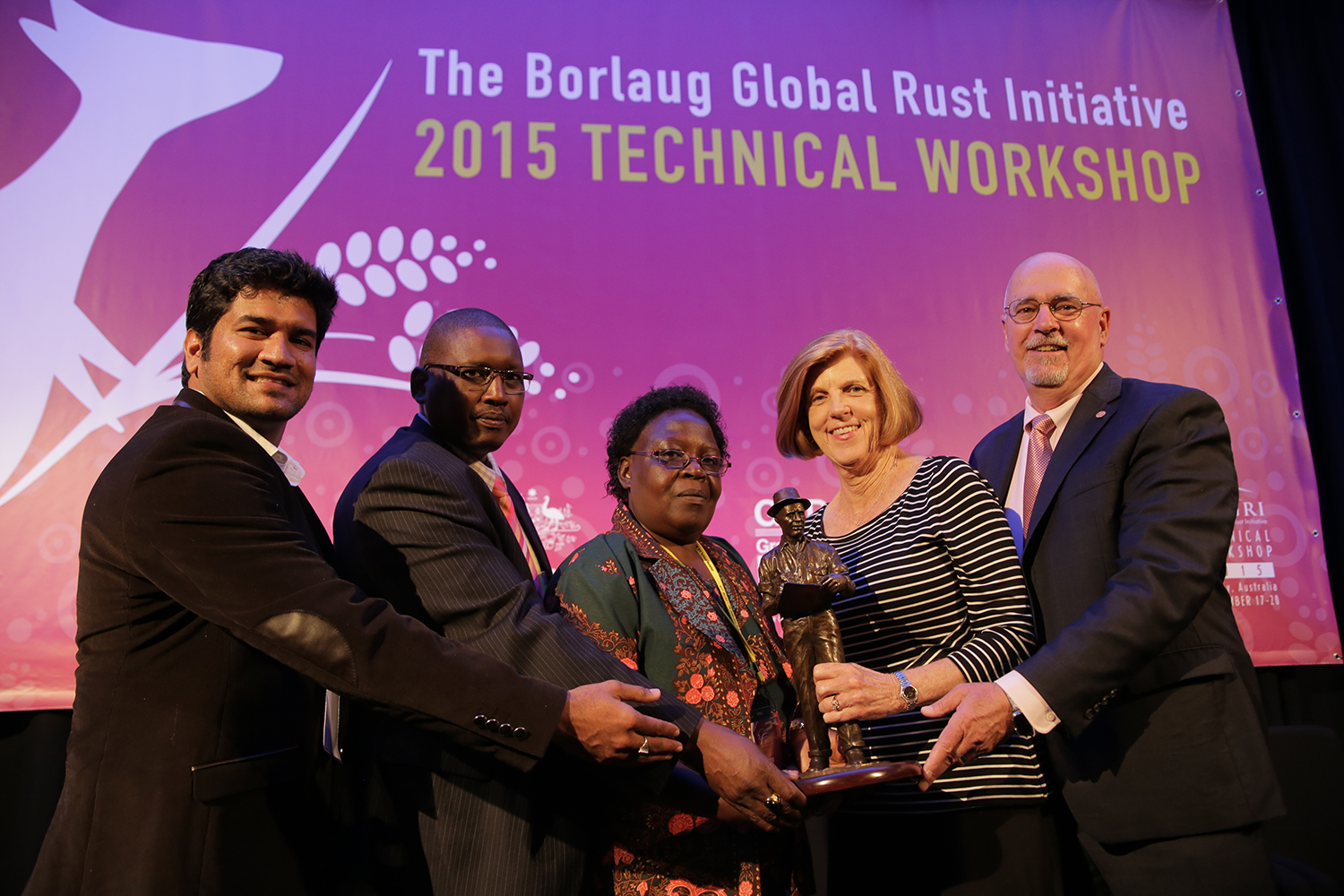
Kenya
The 2015 Gene Stewardship Team from KALRO in Kenya consisted of Dr. Eliud K. Kireger (KALRO Director General), Ruth Wanyera (Senior Plant Pathologist, KALRO), Godwin Macharia (Wheat Breeder, KALRO), Peter Njau (Senior Wheat Breeder, KALRO), and Immaculate N. Maina (Director, Njoro Station). Sridhar Bhavani (CIMMYT Wheat Breeder) nominated the team.
“The team won the award for their work since 2008 in building a collaborative platform in Njoro to test wheat germplasm from all over the world, and for developing the capacity of a rust screening program that has successfully tested thousands and thousands of the world’s wheat varieties against rust. With their fellow East Africans in Ethiopia — who won the Gene Stewardship Award in 2014 — the Kenya team from KALRO are at Ground Zero in the global effort to develop and deploy durably rust resistant wheat varieties and keep the world wheat-secure,” said Ronnie Coffman, upon announcing the award in 2015.
For more about the Kenya team, read the BGRI Blog: Kenya wheat team wins prestigious 2015 Gene Stewardship Award. You can watch the team receive the video: 2015 Gene Stewardship Award Video. Best is to watch the profile of the team and their efforts in Chris Knight’s remarkable 2015 video here, Fighting Wheat Rust in Kenya.
2014
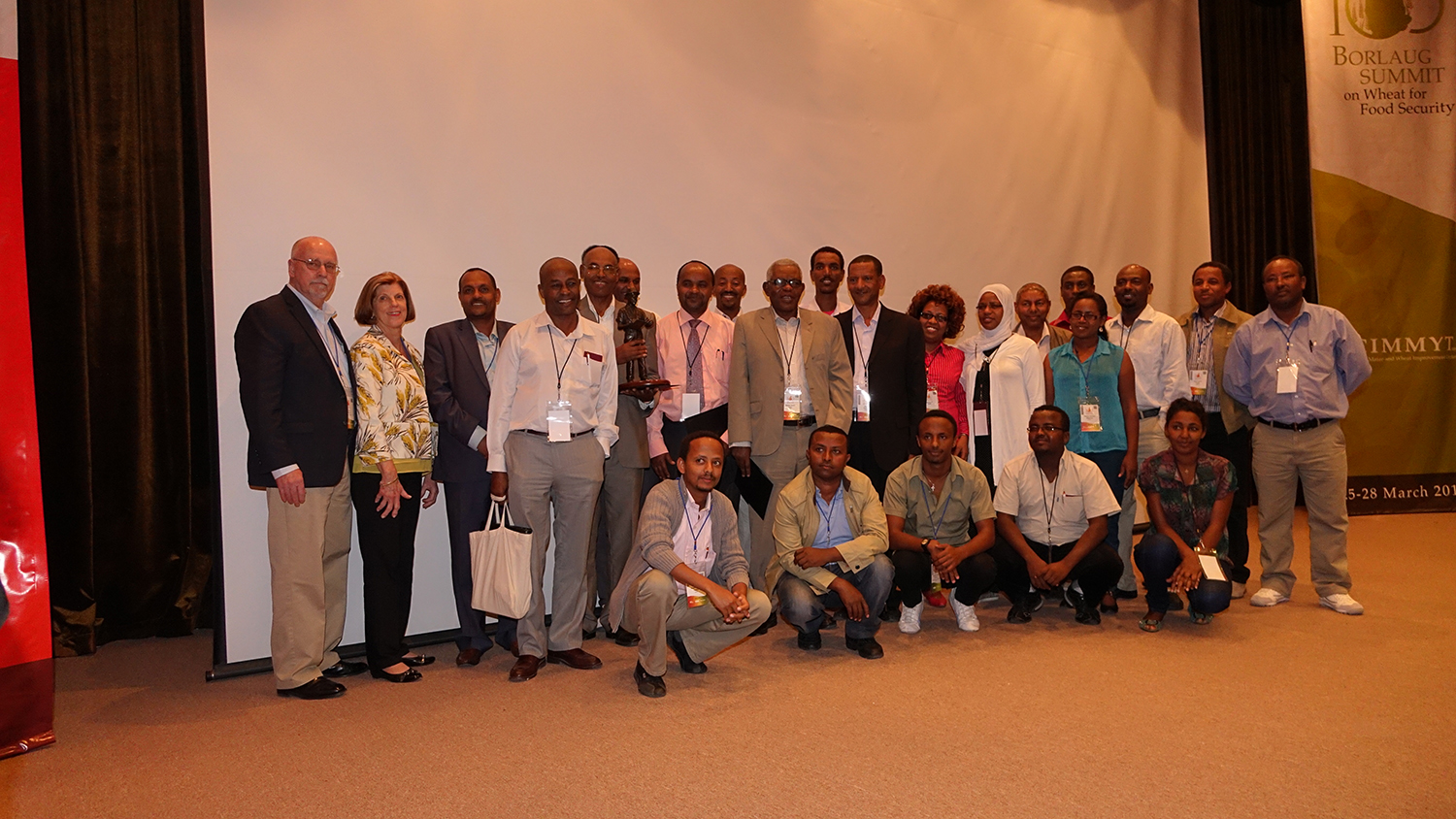
Ethiopia
The 2014 Gene Stewardship Team from Ethiopia consisted of members of the Ethiopian Institute of Agricultural Research Institute (EIAR), Dr. Bedada Girma Buta (DRRW, country coordinator), Dr. Ayele Badebo (senior pathologist), Mr. Solomon Gelalcha (Wheat breeder and Kulumsa Research Director), Dr. Bekele Hundie (senior pathologist) and Dr. Getaneh Woldeab (senior pathologist). All Ethiopians who attended the 2014 BGRI Technical Workshop in Obregón, Mexico, came up on stage to celebrate the award.
The EIAR team received the award for addressing various aspects of rust pathology and accelerating the development/deployment of rust resistant wheat varieties in Ethiopia. Equally important was the collaboration initiated between this team and international scientists from around the globe in conducting wheat research of common interest. These collaborative efforts have led to the generation of new knowledge, the discovery of novel stem rust resistance in wheat, and the rapid development and deployment of Ug99 resistant cultivars in farmers’ fields. These efforts have increased the productivity of wheat in Ethiopia and resulted in reducing the vulnerability of wheat to Ug99 for the entire world.
For more, watch the 2013 Gene Stewardship Award Video and the 2014 video, The DRRW Project in Ethiopia – Capacity Building, Collaboration and New Wheat Varieties for Farmers.
2013
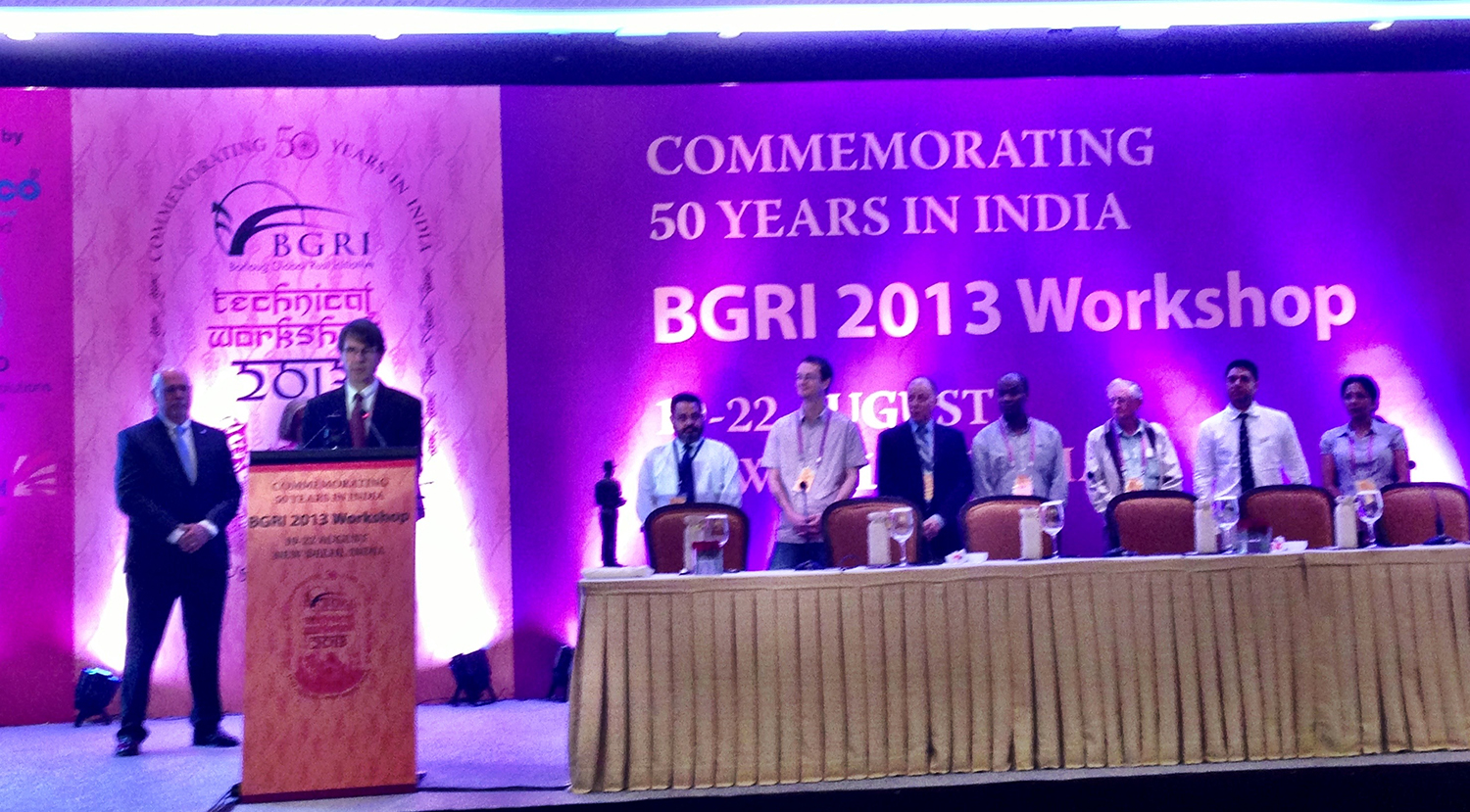
Australia
The 2013 Gene Stewardship Team from Australia consisted of members from three institutions who collectively are known as the Australian Cereal Rust Control Team: Peter Dodds, Jeff Ellis, Evans Lagudah, Rohit Maga, Sambasivam Periyannan, Wolfgang Spielmeyer, and Michael Ayliffe from CSIRO Plant Industry; Urmil Bansal, Harbana Bariana, Haydar Karaoglu, Robert McIntosh, Robert Park, Davinder Singh, Collin Wellings and Peng Zhang (secunded from the NSW Department of Primary Industries) from the University of Sydney Plant Breeding Institute; and Ian Dundas from the University of Adelaide. Those awardees who were present at the BGRI Technical Workshop in India when the award was announced by Ronnie Coffman and Jeanie Borlaug went up on stage to receive the award.
One method the Australian researchers employ to create durably resistant varieties is to “stack” multiple genes together, building a stronger barrier for rust to overcome. In effect, if rust is able to unlock the door, it finds another locked door behind it. The deployment of wheat varieties with stacked resistance genes helps ensure that each new variety will remain immune to the ravages of rust for longer periods of time. The Australian team also utilizes molecular markers to simplify the process of creating varieties with disease resistance in addition to higher yields and other desirable traits.
“The collaborative nature of the three institutions is similar to resistance genes: working together they accomplish more good than one alone,” said Sarah Evanega, associate director of science for the DRRW, in 2013.
For more, read the 2013 BGRI blog: Aussie team recognized for responsible gene stewardship.
2012
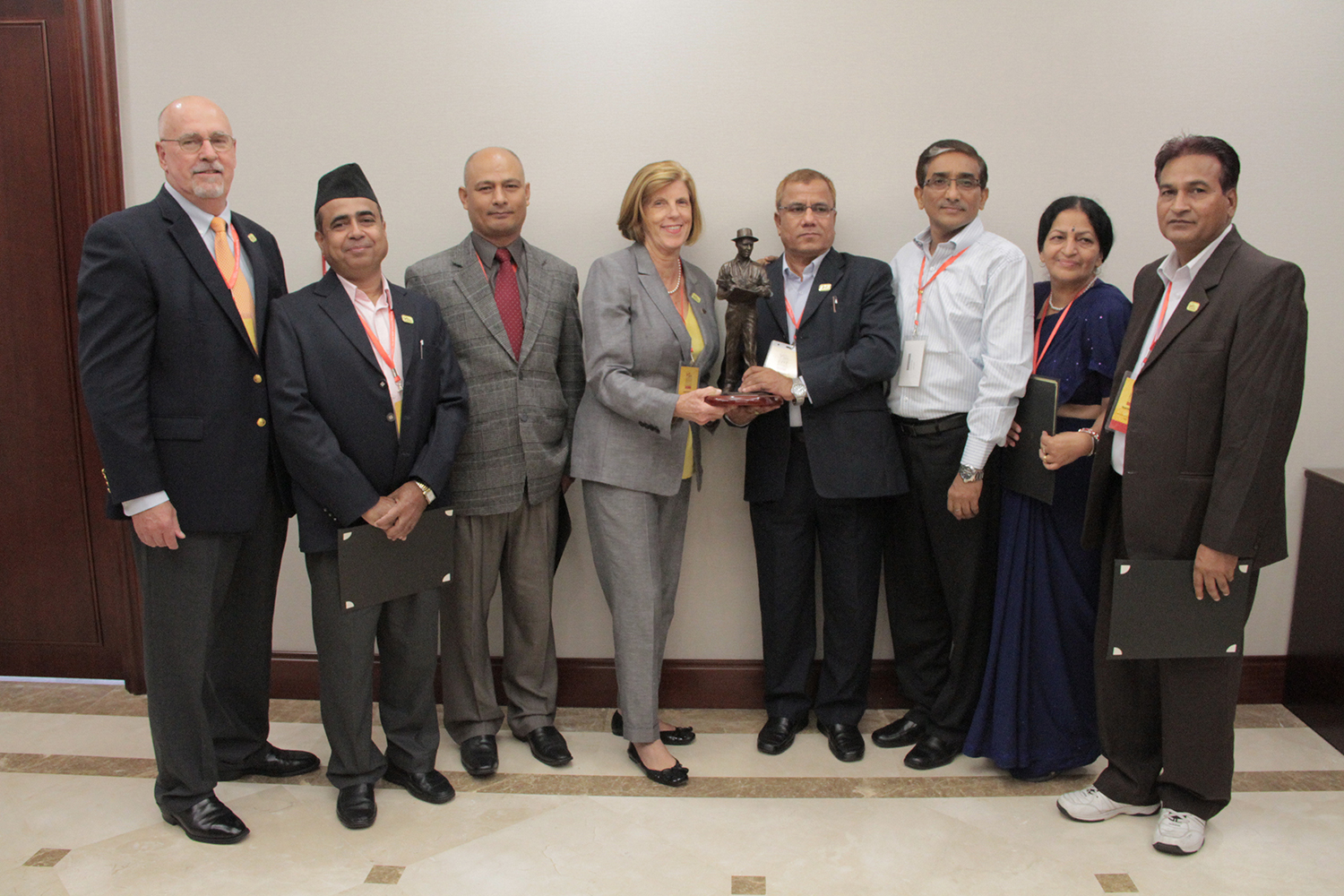
Nepal
The first Borlaug Global Rust Initiative (BGRI) Gene Stewardship Award was instituted to recognize a researcher or team of researchers serving a national breeding program or other nationally based institution. Award recipients were to demonstrate excellence in the development, multiplication, and/or release of rust resistant wheat varieties through appropriate means that encourage diversity and complexity of resistance, promote the durability of the materials, and help implement BGRI’s goal of responsible gene deployment and stewardship.
The 2012 award went to a team from the Nepal Agriculture Research Center, or NARC, led by Madan Raj Bhatta and consisting of Sarala Sharma, Dhruba Bahadur Thapa, Nutan Raj Gautam, Baidya Mahto, and Deepak Bhandari. The team was nominated by Arun Joshi (CIMMYT senior wheat breeder).
“The wheat research team of Nepal has contributed remarkably to bringing about the excellence in the development and release of rust resistant wheat varieties, seed multiplication of resistant varieties with diverse genetic backgrounds, disease surveillance, participatory research with farmers, and improvement of livelihoods of small-scale farmers to combat the problems of food security,” said Joshi in 2012. “This shows what a small program can do to serve farmers and enhance productivity and sustainability.”
Read more in the 2012 CIMMYT blog post, Nepal team receives the 1st Gene Stewardship Award.
